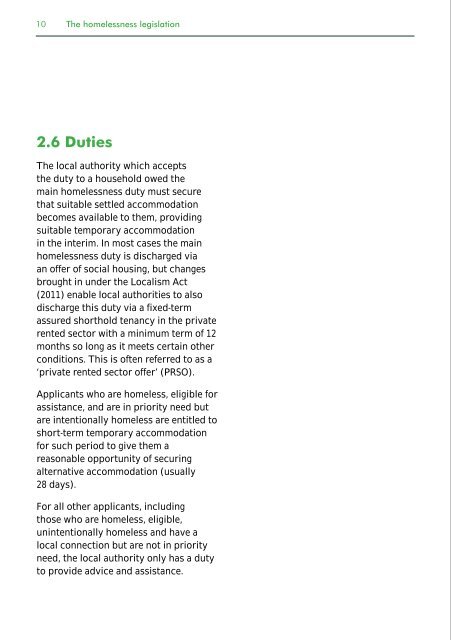The homelessness legislation
The%20homelessness%20legislation,%20an%20independent%20review%20of%20the%20legal%20duties%20owed%20to%20homeless%20people
The%20homelessness%20legislation,%20an%20independent%20review%20of%20the%20legal%20duties%20owed%20to%20homeless%20people
You also want an ePaper? Increase the reach of your titles
YUMPU automatically turns print PDFs into web optimized ePapers that Google loves.
10 <strong>The</strong> <strong>homelessness</strong> <strong>legislation</strong><br />
11<br />
3. <strong>The</strong> impact of the current <strong>legislation</strong><br />
on single homeless people<br />
2.6 Duties<br />
<strong>The</strong> local authority which accepts<br />
the duty to a household owed the<br />
main <strong>homelessness</strong> duty must secure<br />
that suitable settled accommodation<br />
becomes available to them, providing<br />
suitable temporary accommodation<br />
in the interim. In most cases the main<br />
<strong>homelessness</strong> duty is discharged via<br />
an offer of social housing, but changes<br />
brought in under the Localism Act<br />
(2011) enable local authorities to also<br />
discharge this duty via a fixed-term<br />
assured shorthold tenancy in the private<br />
rented sector with a minimum term of 12<br />
months so long as it meets certain other<br />
conditions. This is often referred to as a<br />
‘private rented sector offer’ (PRSO).<br />
Applicants who are homeless, eligible for<br />
assistance, and are in priority need but<br />
are intentionally homeless are entitled to<br />
short-term temporary accommodation<br />
for such period to give them a<br />
reasonable opportunity of securing<br />
alternative accommodation (usually<br />
28 days).<br />
<strong>The</strong> intention of the current<br />
<strong>homelessness</strong> <strong>legislation</strong> is to limit<br />
entitlement to settled accommodation<br />
to those households considered to<br />
be most vulnerable and victims of<br />
circumstances beyond their control.<br />
However, a significant number of<br />
homeless applicants, particularly single<br />
people, have no right to accommodation<br />
or adequate help to prevent or relieve<br />
their <strong>homelessness</strong>, even if they are<br />
sleeping rough.<br />
Between April 2014 and March 2015<br />
fewer than half (48% - 54,430) of those<br />
who made a <strong>homelessness</strong> application<br />
were owed the main <strong>homelessness</strong><br />
duty. 1 Overall, one quarter of applicants<br />
(28,518) were found not to be homeless 2 ,<br />
eight per cent (8,990) were deemed to be<br />
intentionally homeless 3 , and a further 18<br />
per cent (20,420) were considered not to<br />
be in priority need so not owed the<br />
main duty. 4<br />
A greater proportion of applicants owed<br />
the main <strong>homelessness</strong> duty are families<br />
with dependent children compared to<br />
single applicants. Of the applicants who<br />
were owed the main duty in 2014/15,<br />
72 per cent were households with<br />
dependent children and only 22 per cent<br />
were single applicants. 5<br />
3.1 Assessing<br />
vulnerability<br />
Local authorities have discretion to<br />
determine whether a single household<br />
is considered sufficiently vulnerable<br />
(based on the criteria set out above) to<br />
be in priority need.<br />
<strong>The</strong> test case that has played a key role<br />
in how the vulnerability threshold was<br />
applied was Pereira v Camden Council<br />
(1998). <strong>The</strong> case gave rise to the ‘Pereira<br />
Test’, which stated that a person is<br />
vulnerable “if their circumstances are<br />
such that they would suffer more when<br />
homeless than ‘the ordinary homeless<br />
person’ and would suffer an injury<br />
or other detriment that the ordinary<br />
homeless person would not.” Recent<br />
cases further restricted this definition, to<br />
For all other applicants, including<br />
those who are homeless, eligible,<br />
unintentionally homeless and have a<br />
local connection but are not in priority<br />
need, the local authority only has a duty<br />
to provide advice and assistance.<br />
1. Department for Communities and Local Government (DCLG) (2016), Statutory <strong>homelessness</strong> live tables,<br />
Table 770: decisions.<br />
2. Ibid.<br />
3. Ibid.<br />
4. Ibid<br />
5. DCLG (2016), Statutory <strong>homelessness</strong> live tables, Table 780: accepted household type.


